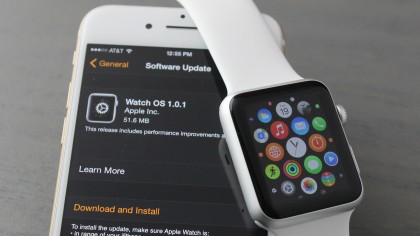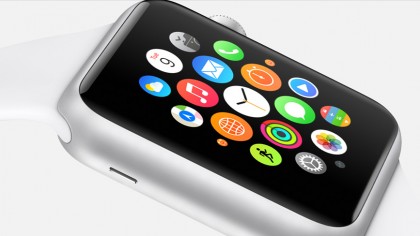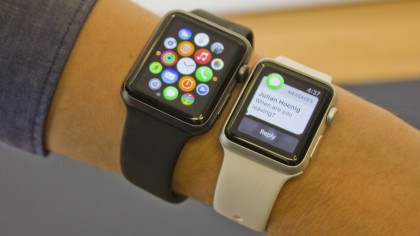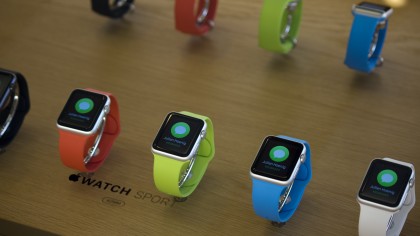Why I'm more excited about the Apple Watch 2 than the iPhone 7
Smartphone innovation is on the wane – watches are where it's at

Sign up for breaking news, reviews, opinion, top tech deals, and more.
You are now subscribed
Your newsletter sign-up was successful
It feels weird getting ready for the launch of a new iPhone and not feeling much excitement about the new phone. But the Apple Watch 2? Well, that's a new device that really could do something special.
Like me, you may have noticed that phones just aren't evolving as fast as they used to, with new technology no longer packed into every corner as companies try to convince consumers that a shiny new feature is the only way to illuminate their dull existence.
The megapixel war is over, with common sense prevailing and 12-16MP becoming the norm. Screen sizes have stopped growing so rapidly, and the urge to stuff ever more cores into the hearts of smartphones has seemingly ceased (in the western world at least).
But along with this common-sense outlook comes the feeling that there's nothing exciting around the corner – that we're now living in a world where the iterative refinement of existing features is the best we're going to get.
Apple has often embodied this approach better than any other manufacturer, refusing to go beyond dual-core processors, sticking to lower-resolution cameras and offering less-sharp screens than most of its cheaper rivals.
However, in the past you could at least always rely on every 'new-numbered' iPhone (the 4, 5, 6 etc) bringing a new form factor, the start of a new two-year chapter of iPhone evolution.
With the new iPhone, however (if the heavy iPhone 7 rumors are to be believed), we're more likely to be getting the iPhone '6SS' in all but name, a handset that keeps the same form factor and 4.7-inch screen as the iPhone 6 and 6S, and plugs in a few tweaks to make it 'new'.
Sign up for breaking news, reviews, opinion, top tech deals, and more.
Depending on your viewpoint when it comes to new smartphones, this is either the WORST THING IN THE WORLD or a shrug, accompanied by a mental note to see if the new iPhone is worth buying when you're due an upgrade.

And actually, both reactions are valid. The tech-loving spec-fiends will highlight how Apple has run out of ideas about how to change its phones – how it's always cared more about 'doing enough' and not innovating, while still charging the same premium prices.
The less-caring smartphone buyer, meanwhile – one who's certain they're getting another iPhone next anyway, as that's what they like and are used to – will nod, agreeing that there are not a lot of ways to radically change a smartphone these days and that polishing the rougher edges is fine, and they'll probably just buy the 6S.
The thing is, innovation in smartphone world is slowing down rapidly. Samsung is the only brand that's managed to wrangle new features (a curved display, heart rate monitors, superb cameras) into a phone that's attractive to the masses.
But even that effort – one that really worked in reviving the brand's fortunes, it had to be said (at least before its Note 7 handsets started spontaneously combusting) has probably run out of steam.
The S8 range will be labelled uninteresting if it's purely iterative, and Samsung will need to make something crazy – like a foldable smartphone – useable if it's to keep hold of its 'innovative' tag.
Apple's customers, on the other hands, are used to iteration – tweaking cameras, improving screens, dialling up power enough to keep battery life acceptable.

While it always feels like Apple is holding something back when it comes to smartphone innovation, there aren't actually a lot of places to go – so Apple refines the bits that matter: audio experience, photography, making the screen more pleasant to look at.
(Dropping the headphone jack, something that's almost certain to happen with the new iPhones, could be seen as an innovation, but one that's going to take a lot of effort to convince the buying hordes that it's worth having – but that's a discussion for another day).
Watch this space
But now we get to the Apple Watch 2 – and things start to get interesting. Just as excitement in the smartphone arena is starting to wane, the world of wearables is exploding with awesome ideas.
When I first watched the smartphone emerge as a thing 'normal' people would buy, nearly a decade ago, it was brilliant. The market was littered with triumphs and disasters, impressive innovation and insanely stupid features, and picking out the best handsets was a fun task.
Then everything got good and phones became boring, as all the features on offer became just 'fine', or 'better'. Screens that look great. Cameras that always take okay pictures. Batteries that will usually last well into the evening.
When it comes wearables, however, those Wild West days are back with a vengeance. One day we'll be looking at smart socks, the next a cuff that shoves a smartphone halfway up your arm. Five parts terrible to one part amazing – and that's great for a technology writer.

And the most interesting part is when the craziness gets panned out, and the genuinely useful bits start filtering through.
We've been seeing this in recent years with the amount of Fitbits welded to arms all over the world increasing rapidly – the technology that fitness enthusiasts can strap on is dizzyingly awesome.
So if Apple steps in to ride that wave with a decent Watch 2, it pretty has an open goal to shoot into in terms of its iPhone-toting legions. If the new Watch has GPS, improved fitness-tracking (beyond just step-monitoring and counting how many times you stood up) and a better battery, it's going to tick a lot of the boxes people want checked in a wearable.
That doesn't necessarily mean Apple will have an instant smash on its hands, as there are a lot of things that need to be improved to make the Watch 2 a must-buy.
Battery life is chief among them, and it's currently terrible for any fitness tracking beyond casual workouts. The heart rate monitor seems to hate working accurately during activity (a crucial part), the Workouts app is too limited, and even using a third-party app stinks (I lost all the data from an entire race because I forgot my Garmin, decided to use Strava on my Watch and it froze on the finish line).
But as I said last year, Apple is in pole position to make the world's best running watch. If it imbues the wearable with the right sensors (a gyroscope, GPS, adaptable heart rate monitor) and gets the right app developers on board, it can have a watch that offers excellent run tracking along with a smorgasbord of other smart functions.

And if it actually adds in some decent health monitoring – such as predicting your health levels, inciting you to get healthier in simple ways, providing actual and relevant insights into your daily fitness routines – then it'll be an incredibly powerful lure for those interested in getting fitter through wearables.
I'm certainly not saying that such an Apple Watch 2 will automatically be a success; far from it. The Fitbit Charge HR and Samsung Gear S3 are two excellent examples of how other brands are bringing clever innovation to the fitness tracker / smartwatch space – and of the fierce competition that exists.
But Apple has a massive opportunity here, as the bond it has with its customers is still strong enough that most of them will consider a Watch 2 over a Fitbit or Jawbone when they think about buying something to help them shed the pounds.
I'm not saying the Apple Watch 2 will bring innovation, style and a genuinely compelling use-case – but it's nice to feel excited that it might.
- Read our in-depth review of the Apple Watch

Gareth has been part of the consumer technology world in a career spanning three decades. He started life as a staff writer on the fledgling TechRadar, and has grew with the site (primarily as phones, tablets and wearables editor) until becoming Global Editor in Chief in 2018. Gareth has written over 4,000 articles for TechRadar, has contributed expert insight to a number of other publications, chaired panels on zeitgeist technologies, presented at the Gadget Show Live as well as representing the brand on TV and radio for multiple channels including Sky, BBC, ITV and Al-Jazeera. Passionate about fitness, he can bore anyone rigid about stress management, sleep tracking, heart rate variance as well as bemoaning something about the latest iPhone, Galaxy or OLED TV.